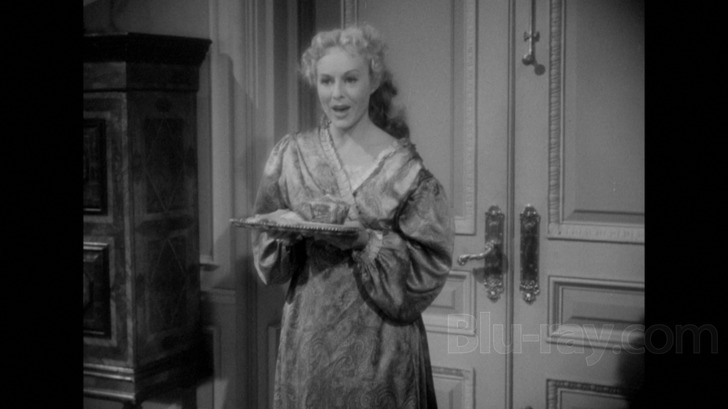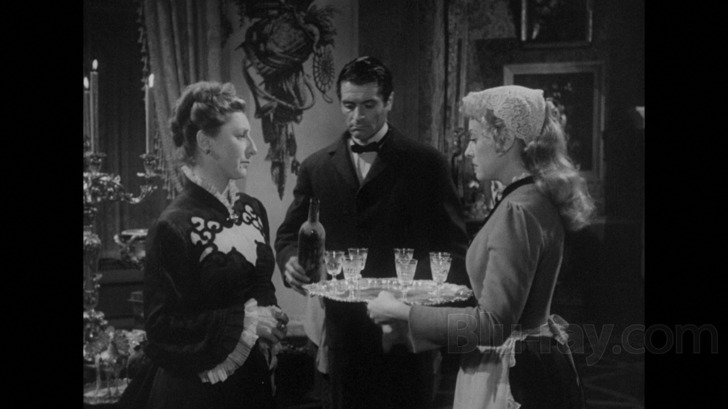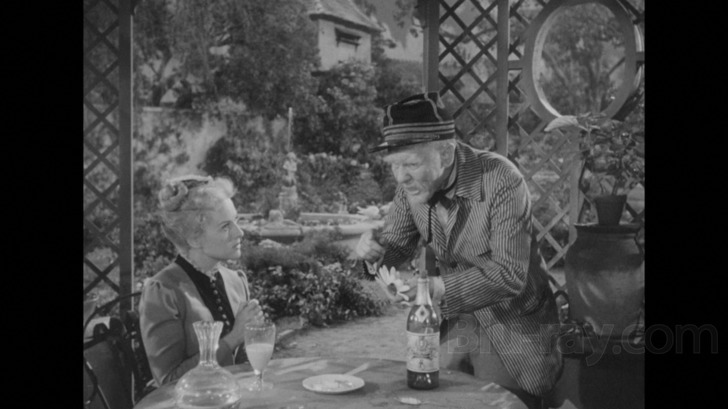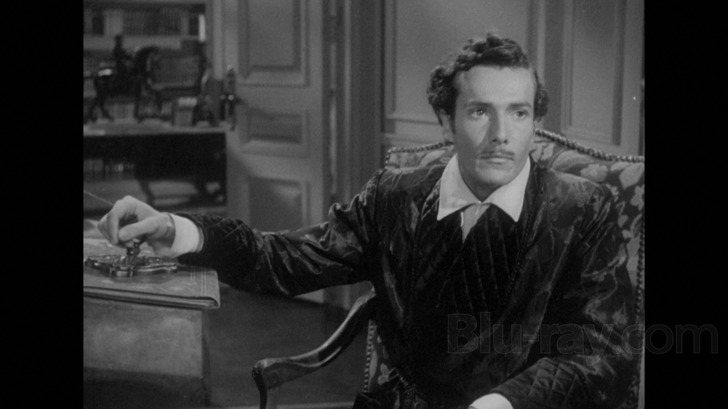Diary of a Chambermaid Blu-ray Movie
HomeDiary of a Chambermaid Blu-ray Movie 
Olive Films | 1946 | 91 min | Not rated | Feb 26, 2013
Movie rating
6.5 | / 10 |
Blu-ray rating
| Users | 0.0 | |
| Reviewer | 3.0 | |
| Overall | 3.0 |
Overview
Diary of a Chambermaid (1946)
Starring: Paulette Goddard, Burgess Meredith, Hurd Hatfield, Francis Lederer, Judith AndersonDirector: Jean Renoir
| Drama | Uncertain |
| Romance | Uncertain |
Specifications
Video
Video codec: MPEG-4 AVC
Video resolution: 1080p
Aspect ratio: 1.37:1
Original aspect ratio: 1.37:1
Audio
English: DTS-HD Master Audio Mono
Subtitles
None
Discs
25GB Blu-ray Disc
Single disc (1 BD)
Playback
Region A (B, C untested)
Review
Rating summary
| Movie | 2.5 | |
| Video | 2.5 | |
| Audio | 3.0 | |
| Extras | 0.0 | |
| Overall | 3.0 |
Diary of a Chambermaid Blu-ray Movie Review
Dear Diary: SOS.
Reviewed by Jeffrey Kauffman March 1, 2013There’s more than a little (perhaps) unintended irony when Paulette Goddard, playing ambitious servant Celestine in
the 1946 Jean Renoir film The Diary of a Chambermaid, confides in scullery maid Louise (Irene Ryan) that she’s
sick
of working for others and will seduce the next man she meets, but only if he has money. Love? That’s for fools, at
least in Celestine’s world view. But money—that’s the key to happiness. It’s ironic for Goddard managed to
land at least three husbands (or quasi-husbands, as the case may be) whose personal wealth and connections
definitely benefited the actress in both personal and professional terms. Goddard’s early life is swathed in mystery, a
mystery only encouraged by the actress herself who repeatedly fudged her birth year (it varies by over a decade in
different accounts), birth place and even her parentage (Goddard was sued—unsuccessfully—by her estranged
biological father when she claimed he was not her biological father). Depending on which birth year is
subscribed to, Goddard might have been as young as eleven when she married for the first time (this only
argues for a different birth year, of course, as it’s more likely that she was at least sixteen, which is of course still
incredibly young). That marriage quickly ended in divorce but left Goddard the then staggering settlement of
several hundred thousand dollars, an amount which really could have set her up for life out of the public eye. But
Goddard was nothing if not ambitious (rather like Celestine). Through a rather circuitous series of events, she
ultimately ended up dating (and according to some events, secretly marrying) Charlie Chaplin, who gave the long
struggling actress her breakthrough role in
Modern Times. Goddard had at least mustered her way on to the B-list, if not the actual A-list, and not
content to sit idly by while Chaplin planned his next film, set out on a number of other projects, most notably her nearly
successful lobbying effort to play Scarlett O’Hara in Gone with the Wind. After making The Great Dictator with Chaplin in 1940, the couple split two years thereafter, which also
seemed to precipitate Goddard’s slow but steady decline as a major film actress. After her film career had largely
dissipated, Goddard ended up marrying celebrated author Erich Maria Remarque (All Quiet on the Western Front), who
upon his death left Goddard yet another fortune (including a huge art collection) which allowed Goddard to
spend her remaining years as a regular on the New York City social scene.
But sandwiched in between her relationships with Chaplin and Remarque came a perhaps more unexpected marriage—
to Burgess Meredith, beloved by many for his supporting turn in Rocky, but also the erstwhile Penguin from the 1960’s campfest television version of
Batman. Long before
Meredith indelibly imprinted his nasal rasp and bizarre laugh on an entire generation of kids (and, frankly, adults) in
Batman, he had racked up considerable (and highly lauded) credits on Broadway and in films, and he was in fact
thought of as something of triple threat, working regularly not just as an actor, but also as a director and writer.
Meredith had actually worked with Goddard before their marriage in the 1940 film Second Chorus, but he went
on to produce (and in the case of The Diary of a Chambermaid, co-write) two more films which offered nice parts
for Goddard (the other is 1948’s On Our Merry Way, a portmanteau of comedy bits).

Jean Renoir had already proven himself to be one of the keenest observers of class differences in his two classics The Rules of the Game and La Grande Illusion, but, alas, lightning was not to strike thrice, at least not with regard to The Diary of a Chambermaid. Based on a 1900 novel which indeed exploited the petty dysfunctions of the ruling class, it would have seemed to have been a near perfect project for Renoir (as indeed it also seemed for Luis Buñuel, who remade the film in 1964), but perhaps due to the tonally imbalanced screenplay, the film is a hodgepodge of ideas and styles. At one moment almost broad comedy, at the next verging on Grand Guignol, this is a Chambermaid who doesn’t know which “room” in the house is under her proper purview.
We meet Celestine (Paulette Goddard) and scullery maid Louise (Irene Ryan, future Granny of The Beverly Hillbillies) as they arrive to take new jobs at the Lanlaire Estate. They are met by officious (and actually vicious) valet Joseph (Francis Lederer), who makes no bones about finding Louise too unattractive to even be considered for employment. That sets Celestine off on a tirade, and Joseph relents. Celestine soon discovers she may have not made the wisest decision in sticking up for Louise, not due to any fault of Louise’s, but due to the fact the the Lanlaire house is a roiling pit of Freudian excesses.
The putative head of the household, Captain Lanlaire (Reginald Owen), is a henpecked victim of his overbearing wife (Judith Anderson). Madame Lanlaird seems to have a rather Oedipal relationship with her estranged son Georges (Hurd Hatfield), and it turns out she has actually hired Celestine to be Georges’ lover, in an attempt to “heal” the boy of his emotional problems, problems which seem to stem squarely from his relationship with his Mother. In the meantime, Celestine is fighting off advances of varying degrees from the Captain, Joseph and a nutty neighbor named Captain Mauger (Burgess Meredith, in a completely peculiar Walter Brennan impersonation).
The film is all over the map from both a subject matter standpoint as well as tone. Renoir attempts to deal with the class issues that were such important parts of some of his other features, drawing distinctions between the patrician Lanlairds and the working class, but there’s no real sympathy for any of the supposed lowly characters, with the possible exception of Louise. Joseph is a scoundrel (and ultimately much more than that), but perhaps most devastating to the film’s effectiveness, Celestine is hardly someone the typical audience member is going to root for. She’s conniving, manipulative and an out and out coquette, at least some of the time. She’s also prone to screaming uncontrollably when violence breaks out.
Goddard is fine in the role, and has some excellent moments, and the varied performers are all screwed in rather tightly to their typecast roles. Anderson is the uptight matron, Owen is the addlepated elder, Ryan is the fussy and neurotic dowdy woman, and Hatfield is the tamped down, emotionally distant young man. That leaves Lederer, who simply eviscerates the other actors with his steely persona and disturbingly violent mien. This film may claim to be about the chambermaid, but the smart money is on the valet, for it’s Joseph who ends up being the most unforgettable character in this otherwise pretty turgid melodrama.
Diary of a Chambermaid Blu-ray Movie, Video Quality 

The Diary of a Chambermaid is presented on Blu-ray courtesy of Olive Films with an AVC encoded 1080p transfer in 1.37:1. Unfortunately the elements used for this high definition transfer have some recurrent and troubling problems. The bulk of the film is littered with noticeable print through and emulsion degradation. It's especially bad in the first twenty or so minutes, and then relents, at least intermittently, though it's certainly still visible if you're looking for it. It returns with a vengeance for the final scene with Goddard and Hatfield in the train car. There's also more routine damage in the shape of flecks and specks. Contrast also varies at least somewhat, though the bulk of the film is fairly consistent if not extremely strong. The overall image is acceptably sharp (though Renoir frequently films Goddard in soft focus) but certainly nowhere near the levels we've seen in other (probably better curated) black and white films of this era, both from Olive itself as well as other labels. This isn't unwatchable by any means, but videophiles are certainly going to notice the flaws that were no doubt endemic in the source elements and which were not corrected or ameliorated with any sort of restoration.
Diary of a Chambermaid Blu-ray Movie, Audio Quality 

The Diary of a Chambermaid features a lossless DTS-HD Master Audio Mono track which is nominally better than the image quality, but which like the image quality shows signs of age and wear and tear. There's noticeable hiss throughout the track, strangely much more audible toward the middle section of the film (by contrast, the worst print through in the image quality is at the beginning and end). Fidelity is decent, with dialogue and score (which features heavy use of the song "Fascination") fairly cleanly presented. The track definitely is a product of its era, and so the typical boxy midrange is more than apparent.
Diary of a Chambermaid Blu-ray Movie, Special Features and Extras 

No supplements are offered on this Blu-ray disc.
Diary of a Chambermaid Blu-ray Movie, Overall Score and Recommendation 

It's fascinating (no pun intended, considering the film's use of "Fascination") to me that two iconic filmmakers, Jean Renoir and Luis Buñuel, were both drawn to this property and yet both failed to really successfully handle it as well as might have been hoped. In Renoir's case, he was hobbled by an ineffective screenplay and a producer-writer who also wanted to co- star and feature his then-wife in the lead. Buñuel may simply have been a victim of his own well known excesses. The Diary of a Chambermaid in Renoir's formulation hovers uneasily in a netherworld that is part social commentary, part melodrama, and part Freudian overkill. The result isn't cohesive in any meaningful way, but it's strangely compelling nonetheless. Renoir fans will probably want to check this out one way or the other, despite its flaws, but it's obvious the source elements utilized for this Blu-ray were in questionable shape. Unfortunately the film is of such little general interest the hope for what would be an extremely expensive and time consuming full scale restoration is probably nil.
Similar titles
Similar titles you might also like

My Beautiful Laundrette
1985

Damsels in Distress
2011

The Magnificent Ambersons
1942

Letter from an Unknown Woman
Signature Edition
1948

Darling
1965

All That Heaven Allows
1955

The Heiress
1949

Will Success Spoil Rock Hunter?
Limited Edition to 3000
1957

The Landlord
1970

Tess
1979

Vanya on 42nd Street
1994

The Go-Between
1971

Limelight
1952

Wuthering Heights
2011

Reflections in a Golden Eye
Warner Archive Collection
1967

His Girl Friday 4K
includes "The Front Page" (1931) on BD
1931-1940

The Piano 4K
1993

The French Lieutenant's Woman
1981

Bleak House
2005

Touch
Standard Edition
1997